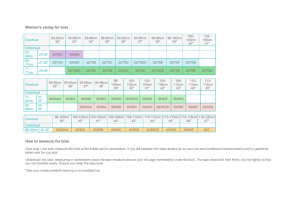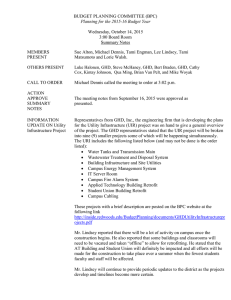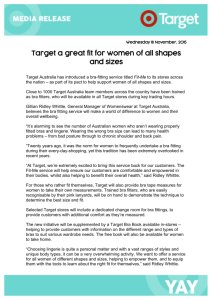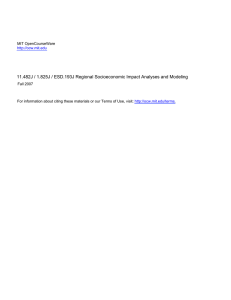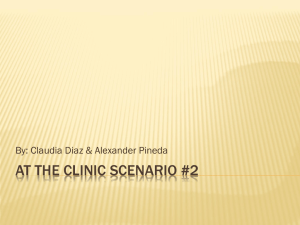G r o u
advertisement
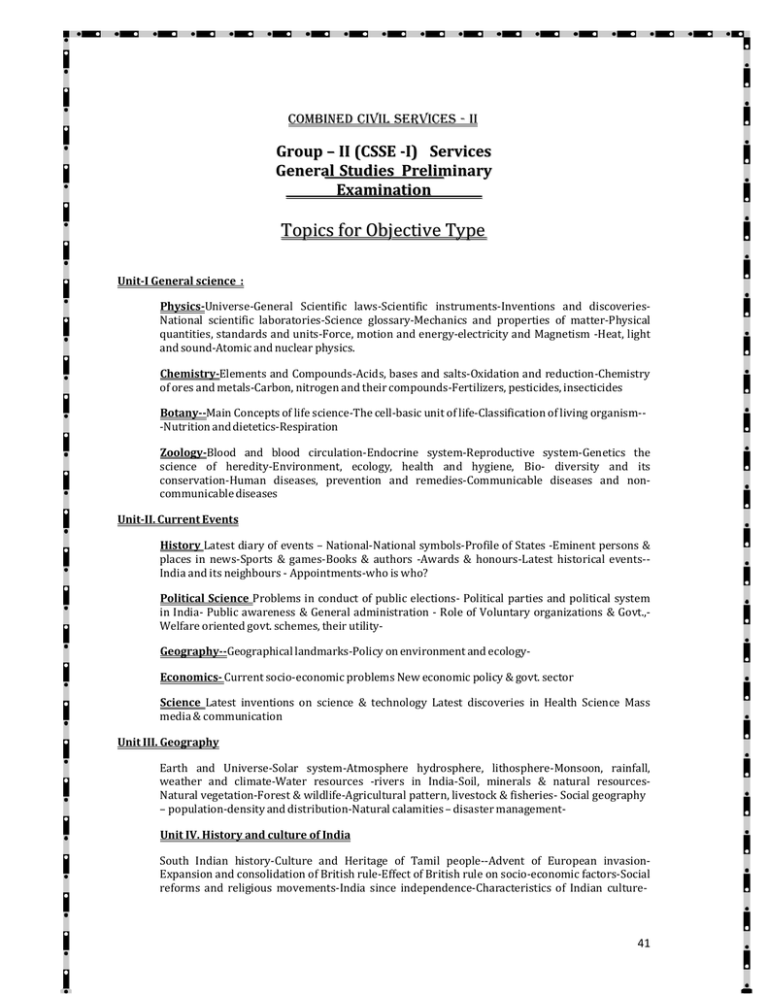
COMBINED CIVIL SERVICES - II Group–II(CSSE‐I) Services General StudiesPreliminary Examination TopicsforObjectiveType Unit‐IGeneralscience : Physics‐Universe‐General Scientific laws‐Scientific instruments‐Inventions and discoveries‐ National scientific laboratories‐Science glossary‐Mechanics and properties of matter‐Physical quantities,standardsandunits‐Force,motionandenergy‐electricityandMagnetism‐Heat,light andsound‐Atomicandnuclearphysics. Chemistry‐ElementsandCompounds‐Acids,basesandsalts‐Oxidationandreduction‐Chemistry oforesandmetals‐Carbon,nitrogenandtheircompounds‐Fertilizers,pesticides,insecticides Botany‐‐MainConceptsoflifescience‐Thecell‐basicunitoflife‐Classificationoflivingorganism‐‐ ‐Nutritionanddietetics‐Respiration Zoology‐Blood and blood circulation‐Endocrine system‐Reproductive system‐Genetics the science of heredity‐Environment, ecology, health and hygiene, Bio‐ diversity and its conservation‐Human diseases, prevention and remedies‐Communicable diseases and non‐ communicablediseases Unit‐II.CurrentEvents HistoryLatestdiaryofevents–National‐Nationalsymbols‐ProfileofStates‐Eminentpersons& places in news‐Sports & games‐Books & authors ‐Awards & honours‐Latest historical events‐‐ Indiaanditsneighbours‐Appointments‐whoiswho? PoliticalScience Problemsinconductofpublicelections‐Politicalpartiesandpoliticalsystem inIndia‐Publicawareness&Generaladministration‐RoleofVoluntaryorganizations&Govt.,‐ Welfareorientedgovt.schemes,theirutility‐ Geography‐‐Geographicallandmarks‐Policyonenvironmentandecology‐ Economics‐Currentsocio‐economicproblemsNeweconomicpolicy&govt.sector Science Latest inventions on science & technology Latest discoveries in Health Science Mass media&communication UnitIII.Geography Earth and Universe‐Solar system‐Atmosphere hydrosphere, lithosphere‐Monsoon, rainfall, weather and climate‐Water resources ‐rivers in India‐Soil, minerals & natural resources‐ Naturalvegetation‐Forest&wildlife‐Agriculturalpattern,livestock&fisheries‐Socialgeography – population‐densityanddistribution‐Naturalcalamities–disastermanagement‐ UnitIV.HistoryandcultureofIndia South Indian history‐Culture and Heritage of Tamil people‐‐Advent of European invasion‐ ExpansionandconsolidationofBritishrule‐EffectofBritishruleonsocio‐economicfactors‐Social reforms and religious movements‐India since independence‐Characteristics of Indian culture‐ 41 Unity in diversity –race, colour, language, custom‐India‐as secular state‐Organizations for fine arts,dance,drama,music‐Growthofrationalist,DravidianmovementinTN‐Politicalpartiesand populistschemes‐Prominentpersonalitiesinthevariousspheres–Arts,Science,literatureand Philosophy – Mother Teresa, Swami Vivekananda, Pandit Ravishankar , M.S.Subbulakshmi, RukmaniArundelandJ.Krishnamoorthyetc. UNIT‐V. INDIANPOLITY ConstitutionofIndia‐Preambletotheconstitution‐ Salientfeaturesofconstitution‐ Union,State and territory ‐ Fundamental rights‐ Fundamental duties‐ Human rights charter‐ Union legislature – Parliament‐ State executive‐. State Legislature – assembly‐ Status of Jammu & Kashmir‐.Localgovernment–panchayatraj–TamilNadu‐JudiciaryinIndia–Ruleoflaw/Due process of law‐ Indian federalism – center – state relations‐Emergency provisions‐ Elections‐ Election Commission Union and State‐ Amendments toconstitution‐ Schedules toconstitution‐ Administrativereforms&tribunals‐Corruptioninpubliclife‐Anti‐corruptionmeasures–Central Vigilance Commission, lok‐adalats, Ombudsman, Comptroller and Auditor General of India‐Righttoinformation‐CentralandStateCommission‐Empowermentofwomen. UNIT‐VI. INDIANECONOMY Nature of Indian economy‐ Five‐year plan models‐an assessment‐Land reforms & agriculture‐ Application of science in agriculture‐Industrial growth‐Role of public sector & disinvestment‐ Development of infrastructure‐ National income Rural welfare oriented programmes‐ Social sector problems – population, education, health, employment, poverty‐ HRD – sustainable economicgrowth‐ EconomictrendsinTamilNadu‐ EnergyDifferentsourcesanddevelopment‐ FinanceCommission‐ PlanningCommission‐ NationalDevelopmentCouncil UNIT‐VI. INDIANNATIONALMOVEMENT EarlyuprisingagainstBritishrule‐1857Revolt‐IndianNationalCongress‐Emergenceofnational leaders‐Gandhi, Nehru, Tagore, Netaji‐Growth of militant movements ‐Communalism led to partition‐RoleofTamilNaduinfreedomstruggle‐Rajaji,VOC,Periyar,Bharathiar&Others‐Birth ofpoliticalparties/politicalsysteminIndiasinceindependence— UNIT‐VII. APTITUDE&MENTALABILITYTESTS Conversion of information to data‐‐Collection, compilation and presentation of data Tables, graphs, diagrams‐Analytical interpretation of data ‐Simplification‐Percentage‐Highest Common Factor (HCF)‐LowestCommonMultiple (LCM)‐RatioandProportion‐Simpleinterest‐Compound interest‐Area‐Volume‐TimeandWorkDecisionmakingandproblemsolving‐LogicalReasoning‐ Puzzles‐Dice‐Visual Reasoning‐Alpha numeric Reasoning‐Number Series‐ Logical Number/Alphabetical/Diagrammatic Sequences …. 42 ghlj;jpl;lk; bghJj; jkpH; (bfhs;Fwptifj; njh;tpw;F) v!;/v!;/vy;/rp/ juk; gFjp ? (m) [ ,yf;fzk; 1/ bghUj;Jjy;: ? bghUj;jkhd bghUisj; njh;t[ bra;jy;; (ii) g[fH; bgw;w E}y; E}yhrphpah; 2/ bjhlUk; bjhlh;g[k; mwpjy; (i) ,j;bjhluhy; Fwpf;fg;bgWk; rhd;nwhh; (ii) milbkhHpahy; Fwpf;fg;bgWk; E}y; 3/ gphpj;bjGJf 4/ vjph;r;brhy;iy vLj;bjGJjy; 5/ bghUe;jhr; brhy;iyf; fz;lwpjy; ;6/ gpiH jpUj;jk; (i) re;jpg;gpiHia ePf;Fjy; (ii) xUik gd;ik -gpiHfis ePf;Fjy; kug[g; gpiHfs;. tGt[r; brhw;fis ePf;Fjy; - gpwbkhHpr; brhw;fis ePf;Fjy; 7/ M’;fpyr; brhy;Yf;F neuhd jkpH;r; brhy;iy mwpjy; 8/ xyp ntWghlwpe;J rhpahd bghUisawpjy; 9/ XbuGj;J xUbkhHp chpa bghUisf; fz;lwpjy; 10/ nth;r;brhy;iyj; njh;t[ bra;jy; 11/nth;r;brhy;iyf; bfhLj;J - tpidKw;W. tpidbar;rk;. tpidahyiza[k; bgah;. bjhHpw; bgaiu - cUthf;fy; 12/ mfu thpirg;go brhw;fisr; rPh; bra;jy; 13/ brhw;fis xG’;FgLj;jp brhw;bwhluhf;Fjy; 14/ bgah;r;brhy;ypd; tifawpjy; 15/ ,yf;fzf; Fwpg;gwpjy; 16/ tpilf;nfw;w tpdhitj; njh;e;bjLj;jy; 17/ vt;tif thf;fpak; vdf; fz;blGJjy; 18/ jd;tpid. gpwtpid. bra;tpid. brag;ghl;L tpid thf;fpa’;fisf; fz;blGJjy; 19/ ctikahy; tpsf;fg;bgWk; bghUj;jkhd bghUisj; njh;e;bjGJjy; 20/ vJif. nkhid. ,iag[ ,tw;Ws; VnjDk; xd;iwj; njh;e;bjGJjy; gFjp ? (M) ,yf;fpak; ; 1/jpUf;Fws; bjhlh;ghd bra;jpfs;. nkw;nfhs;fs; bjhliu epug;g[jy; (gj;bjhd;gJ mjpfhuk; kl;Lk;) 43 md;g[?gz;g?[ fy;tp?nfs;tp?mwpt[?mlf;fk;. xGf;fk;. bghiw. el;g[. tha;ik. fhyk;. typ. Xg;g[utwpjy;. bra;ed;wp. rhd;whz;ik. bghpahiuj;Jizf;nfhly;. bghUs;bray;tif. tpidj;jpl;gk;. ,dpait Twy;/ 2/ mwE}y;fs; ehyoahh;. ehd;kzpf;foif. gHbkhHpehD}W. KJbkhHpf;fh”;rp. jphpfLfk;. ,d;dh ehw;gJ. ,dpait ehw;gJ. rpWg”;rK:yk;. Vyhjp. Xsitahh; ghly;fs; bjhlh;ghd bra;jpfs;. gjpbdz;fPH;f;fzf;F E}y;fspy; gpw bra;jpfs;/ 3/ fk;guhkhazk; ? bjhlh;ghd bra;jpfs; nkw;nfhs;fs;. gh tif. rpwe;j bjhlh;fs;/ 4/ g[wehD}W ? mfehDW. ew;wpiz. FWe;bjhif. I’;FWE}W. fypj;bjhif bjhlh;ghd bra;jpfs;. nkw;nfhs;fs; motiuaiw. vl;Lj;bjhif. gj;Jg;ghl;L E}y;fspy; cs;s gpw bra;jpfs;/ 5/ rpyg;gjpfhuk;?kzpnkfiy?bjhlh;ghd bra;jpfs;. nkw;nfhs;fs;;. rpwe;j bjhlh;fs; cl;gphpt[fs; kw;Wk; Ik;bgUk;?I”;rpW’; fhg;gpa’;fs; bjhlh;ghd bra;jpfs;/ 6/ bghpag[uhzk; ? ehyhapu jpt;tpag;gpuge;jk; ? jpUtpisahlw; g[uhzk; ? njk;ghtzp ? rPwhg;gu [ hzk; bjhlh;ghd bra;jpfs;/ 7/ rpw;wpyf;fpa’;fs; jpUf;Fw;whyf;Fwt”;rp ? fyp’;fj;Jg;guzp ? Kj;bjhs;shapuk;. jkpH;tpL J}J ? ee;jpf;fyk;gfk;. tpf;fpuknrhHd; cyh. Kf;Tlw;gs;S. fhtor;rpe;J. jpUnt’;flj;je;jhjp. Kj;Jf;FkhuRthkp gps;isj; jkpH;. bgj;jynfk; Fwt”;rp. mHfh; fps;istpLJ}J. ,uh$uh$d; nrhHd; cyh bjhlh;ghd bra;jpfs;/ 8/ kndhd;kzpak; ? gh”;rhyp rgjk; ? Fapy; ghl;L ? ,ul;Lw bkhHpjy;; (fhsnkfg;gy [ th; ?mHfpa brhf;fehjh; bjhlh;ghd bra;jpfs);; 9/ ehl;Lg;g[wg;ghl;L ? rpj;jh; ghly;fs; bjhlh;ghd bra;jpfs;/ 10/rka Kd;ndhofs; mg;gh;. rk;ge;jh;. Re;juh;. khzpf;fthrfh;. jpUK:yh;. Fynrfu MH;;thh;. Mz;lhs;. rPj;jiyr; rhj;jdhh;. vr;/V/fpUc&;z gps;is. ckWg;g[yth; bjhlh;ghd bra;jpfs;. nkw;nfhs;fs;. rpwg;gg [ ; bgah;fs;/ 44 gFjp ?,? jkpH; mwp”h;fSk; jkpH;j; bjhz;Lk; 1/ ghujpahh;. ghujpjhrd;. ehkf;fy; ftp”h;. ftpkzp njrpf tpehafk; gps;is bjhlh;ghd bra;jpfs;. rpwe;j bjhlh;fs;. r[pwg;g[g; bgah;fs;/ 2/ kug[f;ftpij ? Koaurd;. thzpjhrd;. Rujh. fz;zjhrd;. cLkiyehuhazftp. gl;Lf;nfhl;il fy;ahzRe;juk;. kUjfhrp bjhlh;ghd bra;jpfs;. milbkhHpbgah;fs;/ 3/ g[Jf; ftpij ,uh/kPdhl;rp. ? e/gpr;rK:h;j;jp. rp/kzp. rpw;gp. rp/R/bry;yg;gh. K/nkj;jh. <nuhL jUK rptuhK. jkpHd;gd;. gRta;ah. mg;Jy;uFkhd;. fyhg;hpah. fy;ahz;$p. “hdf; Tj;jd;. njtnjtd;. rhiy ,se;jpiuad.; rhypdp ,se;jpiuad;. Mye;J}h; nkhfdu’;fd; ? bjhlh;ghd bra;jpfs;. nkw;nfhs;fs;. rpwg;g[j; bjhlh;fs; kw;Wk; vGjpa E}y;fs;/ 4/ jkpHpy; foj ,yf;fpak; ? ehl;Fwpg;g[/ neU ? fhe;jp ? K/t/ ? mz;zh ? Mde;ju’;fk; gp;s;is ehl;Fwpg;g[ bjhlh;ghd bra;jpfs;/ 5/ ehlff;fiy ? ,irf;fiy bjhlh;ghd bra;jpfs; 6/ jkpHpy; rpWfijfs; jiyg;g[ ? Mrphpah; ? bghUj;Jjy; 7/ fiyfs; ? rpw;gk; ? Xtpak; ? ngr;R ? jpiug;glf;fiy bjhlh;ghd bra;jpfs; 8/ jkpHpd; bjhd;ik ? jkpH; bkhHpapd; rpwg;g.[ jpuhtpl bkhHpfs; bjhlh;ghd bra;jpfs; 9/ ciueil ? kiwkiyaofs;. ghpjpkhw;fiy”h;. e/K/nt’;flrhkp ehl;lhh;. uh/gp/ nrJg; gps;is. jpU/tp/f/. itahg[hpg;gps;is ? bkhHp eil bjhlh;ghd bra;jpfs;/ 10/ c/nt/rhkpehj Iah;. bj/bgh/kPdhl;rp Re;judhh;. rp/,yf;Ftdhh; ? jkpH;g;gzp bjhlh;ghd bra;jpfs; 11/ njtneag;ghthzh; ? mfuKjyp. ghtynuW bgU”; rpj;jpudhh;. jkpH;j;bjhz;L bjhlh;ghd bra;jpfs; 12/ $p/a[/nghg; ? tPukhKdpth; jkpH;j;bjhz;L rpwg;g[j; bjhlh;fs; 13/ bghpahh; ? mz;zh ? Kj;Juhkyp’;fj; njth; ? mk;ngj;fh; ? fhkuhrh; ? rKjhaj; bjhz;L/ 14/ jkpHfk; ? CUk; ngUk;. njhw;wk; khw;wk; gw;wpa bra;jpfs; 15/ cyfshtpa jkpHh;fs; rpwg;g[k; ? bgUika[k; ? jkpH;g; gzpa[k; 45 16/ jkpH;bkhHpapy; mwptpay; rpe;jidfs; bjhlh;ghd bra;jpfs; 17/ jkpH; kfsphpd; rpwg;g[ ? md;dp bgrz;l; mk;ikahh;. K:tY}h; uhkhkph;jj;jk;khs;;. lhf;lh;/Kj;Jyl;Rkp bul;o/ tpLjiyg; nghuhl;lj;jpy; kfsph; g’;F (jpy;iyaho ts;spak;ik. uhzp k’;fk;khs;) 18/ jkpHh; tzpfk; ? bjhy;ypay; Ma;t[fs; ? flw; gaz’;fs;; ? bjhlh;ghd bra;jpfs; 19/ cznt kUe;J ? neha; jPh;f;Fk; K:ypiffs; bjhlh;ghd bra;jpfs; 20/ rkag; bghJik czh;j;jpa jha[khdth;. ,uhkyp’;f mofshh;. jpU/tp/ fy;ahz Re;judhh; bjhlh;ghd bra;jpfs; ? nkw;nfhs;fs;. 46 SYLLABUS – GENERAL ENGLISH S.S.L.C. Standard (Objective Type) Grammar PART A 1. Match the following words and Phrases given in Column A with their meanings in Column B. 2.Choose the correct ‘Synonyms’ for the underlined word from the options given 3. Choose the correct ‘Antonyms’ for the underlined word from the options given 4. Select the correct word (Prefix, Suffix) 5. Fill in the blanks with suitable Article 6. Fill in the blanks with suitable Preposition 7. Select the correct Question Tag 8. Select the correct Tense 9. Select the correct Voice 10. Fill in the blanks (Infinitive, Gerund, Participle) 11. Identify the sentence pattern of the following sentence (Subject, Verb, Object….) Blanks with correct ‘Homophones’ 12. Find out the Error (Articles, Prepositions, Noun, Verb, Adjective, Adverb) 13. Comprehension 14. Select the correct sentence 15. Find out the odd words (Verb, Noun, Adjective, Adverb) 16. Select the correct Plural forms 17. Identify the sentence (Simple, Compound, Complex Sentense) 18. Identify the correct Degree. 19.Form a new word by blending the words. 20.Form compound words (Eg: Noun+Verb, Gerund+Noun) 47 Part-B Literature 1. Figures of speech observed in the following Poems: Alliteration – Allusion – Simile – Metaphor – Personification – Oxymoron – Onomatopoeia – Anaphora – Ellipsis - Rhyme Scheme - Rhyming Words – Repetition – Apostrophe A Psalm of Life - Women’s Rights - The Nation United - English words – Snake – The Man He Killed - Off to outer space tomorrow morning - Sonnet No.116 - The Solitary Reaper - Be the Best - O Captain My Captain - Laugh and Be Merry – Earth - Don’t quit - The Apology - Be Glad your Nose is on your face - A sonnet for my Incomparable Mother - The Flying Wonder - To a Millionaire - The Piano – Manliness - Going for water - The cry of the Children - Migrant Bird - Shilpi. 2. Appreciation Questions from Poetry A Psalm of Life - Women’s Rights - The Nation United - English words – Snake – The Man He Killed - Off to outer space tomorrow morning – Sonnet No.116 - The Solitary Reaper - Be the Best - O Captain My Captain - Laugh and Be Merry – Earth - Don’t quit - The Apology - Be Glad your - Nose is on your face - A sonnet for my Incomparable Mother - The Flying Wondr - To a Millionaire - The Piano – Manliness - Going for water - The cry of the Children - Migrant Bird - Shilpi. 3.Important lines from Poems. Where the mind is without fear - The Solitary Reaper - Going for water - A Psalm of Life - Be the Best - Sonnet No.116 4.Questions on the Biography of Mahatma Gandhi - Jawaharlal Nehru - Subash Chandra Bose - Helen Keller Kalpana Chawala - Dr.Salim Ali - Rani of Jhansi - Nelson Mandela – Abraham Lincoln 5.Questions on Shakespeare’s Merchant of Venice (Act IV Court Scene) - Julius Ceasar (Act III Scene 2) Sonnet 116 6.Questions from Oscar Wilde’s The Model Millionaire - The Selfish Giant 48 7.r.Karl Paulnack Music-The Hope Raiser 8.omprehension Questions from the following Motivational Essays: Gopala Krishna Gokhale’s Speech on 25th July in Mumbai in response to The address presented to him by students- Dale Carnegie’s ‘The Road to success- Dr.APJ Abdul Kalam’s ‘Vision for the Nation’(from‘India 2020’) - Ruskin Bond’s ‘Our Local Team’ - Hope Spencer’s ‘Keep your spirits high’ - Deepa Agarwal’s ‘After the storm’ - Brian patten’s ‘You can’t be that no you can’t be that’ 9.Comprehension Questions from the following description of Places Ahtushi Deshpande’s ‘To the land of snow’ - Manohar Devadoss – Yaanai Malai - Brihadeesvarar Temple 10. ritish English – American English Part-C Authors and their Literary Works 1.Match the Poems with the Poets A psalm of Life - Be the Best - The cry of the children - The Piano – Manliness Going for water – Earth -The Apology - Be Glad your Nose is on your face - The Flying Wonder -Is Life But a Dream - Be the Best - O captain My Captain - Snake - Punishment in Kindergarten -Where the Mind is Without fear - The Man He Killed - Nine Gold Medals 2.Which Nationality the story belongs to? The selfish Giant - The Lottery Ticket - The Last Leaf - How the Camel got its Hump - Two Friends – Refugee - The Open Window 3.Identify the Author with the short story The selfish Giant - The Lottery Ticket - The Last Leaf - How the Camel got its Hump - Two Friends – Refugee - The Open Window - A Man who Had no Eyes - The Tears of the Desert – Sam The Piano - The face of Judas Iscariot - Swept Away - A close encounter - Caught Sneezing - The Wooden Bowl - Swami and the sum 4.Whose Auto biography / Biography is this? 49 5.Which Nationality the Poet belongs to ? Robert Frost - Archibald Lampman - D.H. Lawrence - Rudyard Kipling Kamala Das - Elizabeth Barrett Browning - Famida Y. Basheer - Thomas Hardy - Khalil Gibran - Edgar A. Guest - Ralph Waldo Emerson - Jack Prelutsky - F. Joanna - Stephen Vincent Benet - William Shakespeare William Wordsworth - H.W. Long Fellow - Annie Louisa walker Walt Whitman - V.K. Gokak 6.Characters, Quotes, Important Lines from the following works of Indian Authors: Sahitya Akademi Award winner: Thakazhi Sivasankaran Pillai – ‘Farmer’ Kamala Das – 1. Punishment in Kindergarten 2. My Grandmother’s House R.K. Narayan - Swami and the sum - Rabindranath Tagore - Where the mind is without fear - Dhan Gopal Mukherji - Kari, The Elephant - Deepa Agarwal - After the Storm - Dr. APJ Abdul Kalam - Vision for the Nation Indra Anantha Krishna- The Neem Tree - Lakshmi Mukuntan- The Ant Eater and the Dassie - Dr. Neeraja Raghavan - The Sun Beam 7.Drama Famous lines, characters, quotes from Julius Caesar - The Merchant of Venice 8.Match the Places, Poet, Dramatist, Painter with suitable option 9. Match the following Folk Arts with the Indian State / Country 10. Match the Author with the Relevant Title/Character 11. Match the Characters with Relevant Story Title The Selfish Giant - How the camel got its hump - The Lottery ticket - The Last Leaf - Two friends – Refugee - Open window – Reflowering - The Necklace Holiday 12. About the Poets Rabindranath Tagore - Henry Wordsworth Longfellow - Anne Louisa Walker -V K Gokak - Walt Whitman - Douglas Malloch 13. About the Dramatists 50 William Shakespeare - Thomas Hardy 14. Mention the Poem in which these lines occur Granny, Granny, please comb My Hair - With a friend - To cook and Eat - To India – My Native Land - A tiger in the Zoo - No men are foreign – Laugh and be Merry – The Apology - The Flying Wonder 15. Various works of the following Authors – Rabindranath Tagore – Shakespeare - William Wordsworth - H.W. Longfellow – Anne Louisa Walker - Oscar Wilde - Pearl S. Buck 16. What is the theme observed in the Literary works? Snake - The Mark of Vishnu - Greedy Govind - Our Local Team – Where the mind is without fear - Keep your spirits high - Be the best – Bat – The Piano – The Model Millionaire - The Cry of the Children – Migrant bird – Shilpi 17. Famous Quotes – Who said this? 18. To Which period the Poets belong William Shakespeare - Walt Whitman - William Wordsworth - H.W. Longfellow Annie Louisa Walker - D.H. Lawrence 19. Matching the Poets and Poems Discovery – Biking – Inclusion - Granny, Granny, please comb My Hair – With a Friend - To cook and Eat – Bat - To India – My Native Land - A tiger in the Zoo - No men are foreign - Laugh and be Merry – Earth – The Apology - The Flying Wonder - Off to outer space tomorrow morning - Be the best - Is life, but a dream - Women’s rights - The Nation united - English words – Snake – The man he killed 20. Nature centered Literary works and Global issue Environment and Conservation Flying with moon on their wings - Migrant bird - Will Thirst Become Unquenchable? - Going for Water - Swept away - Gaia tells her 51 COMBINED CIVIL SERVICES – II Group–II(CSSE‐I) Services Main Examination General Studies (Degree Standard) D e s c r i p t i v e Type I.RoleandimpactofscienceandTechnologyintheDevelopmentofIndiaandTamil Nadu. Natureofuniverse‐Generalscientificlaws‐Scientificinstruments‐Inventionsanddiscoveries ‐ Scienceglossary‐Physicalquantities,standardsandunits‐Mechanicsandpropertiesofmatter‐ Force, motion and energy‐Heat, light and sound‐Magnetism, ‐electricity and electronics ‐ Elements and ‐compounds ‐Acids, bases and salts‐Oxidation and reduction‐Carbon, nitrogen andtheircompounds‐Fertilizers‐pesticides,insecticides‐Mainconceptsoflifescience‐Thecell‐ basic unit of life‐Classification of living organism‐Nutrition ‐and dietetics‐Respiration ‐Blood andblood–circulation‐Endocrinesystem‐Reproductivesystem‐Animals, plantsandhumanlife‐ Govt.policy‐organizationson Scienceand Technology‐Role,achievement &impact ofScience and ‐technology‐Energy ‐ self sufficiency ‐ oil exploration‐ Genetics ‐ the science of heredity‐ Environment,ecology,healthand‐hygiene,Bio‐diversityanditsconservation‐Humandiseases, preventionandremedies‐Communicablediseasesandnon‐communicablediseases‐Alcoholism andDrugabuse‐Computer‐scienceandadvancement II.AdministrationofUnionandStateswithspecialreferencetoTamilNadu State government organization ‐ structure, functions and control mechanism‐District administration‐roleinpeople’swelfareorientedprogrammes‐IndustrialmapofTamilNadu‐‐ role of state government‐Public Services ‐‐ role of recruitment agencies‐State finance ‐ resources,budgetandfinancialadministration‐UseofITinadministration ‐‐e‐governancein the State‐Natural calamities – Disaster Management Union and State ‐Social welfare ‐ GovernmentsponsoredschemeswithreferencetoTamilNadu‐RelationshipbetweenStateand Union‐Industrial map of India ‐Public Services ‐ role of recruitment agencies in Union Government‐Socialwelfare‐governmentsponsoredschemesbyGovernmentofIndia III.Socio‐EconomicIssuesinIndia/TamilNadu Population Explosion‐ Unemployment issues in India & Tamil Nadu‐ Child Labour‐ EconomicIssues (a)Poverty (b)Sanitation‐RuralandUrban(c)Corruptioninpublic 52 life ‐ Anti ‐Corruption ‐measures ‐ CVC, Lok‐adalats, Ombudsman, CAG.‐Illiteracy‐ Women Empowerment – Role of the Govt. in Women Empowerment ‐ Social injustice to womenfolk ‐ Domestic violence, dowry menace, sexual assault‐Impact of violence on the growth of the nation – Religious violence, ‐‐Terrorism and Communal violence.‐ Human Rights issues‐Right to information ‐ Central and State Commission.‐ Education – Linkage between Education and Economic Growth‐Community Development Programme‐Employment Guarantee Scheme‐Self Employment and Entrepreneurship Development‐RoleofN.G.O’sinSocialWelfare–Govt.PolicyonHealth. IV.CurrentissuesatNationalLevel V.CurrentissuesatStateLevel 53 COMBINED CIVIL SERVICES – II Group- II-A Services Unit‐IGeneralscience : General Studies - Main Examination All Non –Interview Post Topics for Objective Type Physics‐Universe‐General Scientific laws‐Scientific instruments‐Inventions and discoveries‐ National scientific laboratories‐Science glossary‐Mechanics and properties of matter‐Physical quantities,standardsandunits‐Force,motionandenergy‐electricityandMagnetism‐Heat,light andsound‐Atomicandnuclearphysics. Chemistry‐ElementsandCompounds‐Acids,basesandsalts‐Oxidationandreduction‐Chemistry oforesandmetals‐Carbon,nitrogenandtheircompounds‐Fertilizers,pesticides,insecticides Botany‐‐MainConceptsoflifescience‐Thecell‐basicunitoflife‐Classificationoflivingorganism‐‐ ‐Nutritionanddietetics‐Respiration Zoology‐Blood and blood circulation‐Endocrine system‐Reproductive system‐Genetics the science of heredity‐Environment, ecology, health and hygiene, Bio‐ diversity and its conservation‐Human diseases, prevention and remedies‐Communicable diseases and non‐ communicablediseases Unit‐II.CurrentEvents HistoryLatestdiaryofevents–National‐Nationalsymbols‐ProfileofStates‐Eminentpersons& places in news‐Sports & games‐Books & authors ‐Awards & honours‐Latest historical events‐‐ Indiaanditsneighbours‐Appointments‐whoiswho? PoliticalScience Problemsinconductofpublicelections‐Politicalpartiesandpoliticalsystem inIndia‐Publicawareness&Generaladministration‐RoleofVoluntaryorganizations&Govt.,‐ Welfareorientedgovt.schemes,theirutility‐ Geography‐‐Geographicallandmarks‐Policyonenvironmentandecology‐ Economics‐Currentsocio‐economicproblemsNeweconomicpolicy&govt.sector Science Latest inventions on science & technology Latest discoveries in Health Science Mass media&communication UnitIII.Geography Earth and Universe‐Solar system‐Atmosphere hydrosphere, lithosphere‐Monsoon, rainfall, weather and climate‐Water resources ‐rivers in India‐Soil, minerals & natural resources‐ Naturalvegetation‐Forest&wildlife‐Agriculturalpattern,livestock&fisheries‐Socialgeography – population‐densityanddistribution‐Naturalcalamities–disastermanagement‐ UnitIV.HistoryandcultureofIndia South Indian history‐Culture and Heritage of Tamil people‐‐Advent of European invasion‐ ExpansionandconsolidationofBritishrule‐EffectofBritishruleonsocio‐economicfactors‐Social reformsandreligiousmovements‐Indiasinceindependence‐CharacteristicsofIndianculture‐Unity indiversity–race,colour,language,custom‐India‐assecularstate‐Organizationsforfinearts,dance, drama, music‐Growth of rationalist, Dravidian movement in TN‐Political parties and populist schemes‐Prominentpersonalitiesinthevariousspheres–Arts,Science,literatureandPhilosophy 54 –MotherTeresa,SwamiVivekananda,PanditRavishankar,M.S.Subbulakshmi,RukmaniArundel andJ.Krishnamoorthyetc. UNIT‐V. INDIANPOLITY ConstitutionofIndia‐Preambletotheconstitution‐ Salientfeaturesofconstitution‐ Union,State and territory ‐ Fundamental rights‐ Fundamental duties‐ Human rights charter‐ Union legislature – Parliament‐ State executive‐. State Legislature – assembly‐ Status of Jammu & Kashmir‐.Localgovernment–panchayatraj–TamilNadu‐JudiciaryinIndia–Ruleoflaw/Due process of law‐ Indian federalism – center – state relations‐Emergency provisions‐ Elections‐ Election Commission Union and State‐ Amendments toconstitution‐ Schedules toconstitution‐ Administrativereforms&tribunals‐Corruptioninpubliclife‐Anti‐corruptionmeasures–Central Vigilance Commission, lok‐adalats, Ombudsman, Comptroller and Auditor General of India‐Righttoinformation‐CentralandStateCommission‐Empowermentofwomen. UNIT‐VI. INDIANECONOMY Nature of Indian economy‐ Five‐year plan models‐an assessment‐Land reforms & agriculture‐ Application of science in agriculture‐Industrial growth‐Role of public sector & disinvestment‐ Development of infrastructure‐ National income Rural welfare oriented programmes‐ Social sector problems – population, education, health, employment, poverty‐ HRD – sustainable economicgrowth‐ EconomictrendsinTamilNadu‐ EnergyDifferentsourcesanddevelopment‐ FinanceCommission‐ PlanningCommission‐ NationalDevelopmentCouncil UNIT‐VI. INDIANNATIONALMOVEMENT EarlyuprisingagainstBritishrule‐1857Revolt‐IndianNationalCongress‐Emergenceofnational leaders‐Gandhi, Nehru, Tagore, Netaji‐Growth of militant movements ‐Communalism led to partition‐RoleofTamilNaduinfreedomstruggle‐Rajaji,VOC,Periyar,Bharathiar&Others‐Birth ofpoliticalparties/politicalsysteminIndiasinceindependence— UNIT‐VII.APTITUDE&MENTALABILITY TESTS Conversion of information to data‐‐Collection, compilation and presentation of data Tables, graphs, diagrams‐Analytical interpretation of data ‐Simplification‐Percentage‐Highest Common Factor (HCF)‐LowestCommonMultiple (LCM)‐RatioandProportion‐Simpleinterest‐Compound interest‐Area‐Volume‐TimeandWorkDecisionmakingandproblemsolving‐LogicalReasoning‐ Puzzles‐Dice‐Visual Reasoning‐Alpha numeric Reasoning‐Number Series‐ Logical Number/Alphabetical/Diagrammatic Sequences …. 55 ghlj;jpl;lk; bghJj; jkpH; (bfhs;Fwptifj; njh;tpw;F) v!;/v!;/vy;/rp/ juk; gFjp ? (m) [ ,yf;fzk; 1/ bghUj;Jjy;: ? bghUj;jkhd bghUisj; njh;t[ bra;jy;; (ii) g[fH; bgw;w E}y; E}yhrphpah; 2/ bjhlUk; bjhlh;g[k; mwpjy; (i) ,j;bjhluhy; Fwpf;fg;bgWk; rhd;nwhh; (ii) milbkhHpahy; Fwpf;fg;bgWk; E}y; 3/ gphpj;bjGJf 4/ vjph;r;brhy;iy vLj;bjGJjy; 5/ bghUe;jhr; brhy;iyf; fz;lwpjy; ;6/ gpiH jpUj;jk; (i) re;jpg;gpiHia ePf;Fjy; (ii) xUik gd;ik -gpiHfis ePf;Fjy; kug[g; gpiHfs;. tGt[r; brhw;fis ePf;Fjy; - gpwbkhHpr; brhw;fis ePf;Fjy; 7/ M’;fpyr; brhy;Yf;F neuhd jkpH;r; brhy;iy mwpjy; 8/ xyp ntWghlwpe;J rhpahd bghUisawpjy; 9/ XbuGj;J xUbkhHp chpa bghUisf; fz;lwpjy; 10/ nth;r;brhy;iyj; njh;t[ bra;jy; 11/nth;r;brhy;iyf; bfhLj;J - tpidKw;W. tpidbar;rk;. tpidahyiza[k; bgah;. bjhHpw; bgaiu - cUthf;fy; 12/ mfu thpirg;go brhw;fisr; rPh; bra;jy; 13/ brhw;fis xG’;FgLj;jp brhw;bwhluhf;Fjy; 14/ bgah;r;brhy;ypd; tifawpjy; 15/ ,yf;fzf; Fwpg;gwpjy; 16/ tpilf;nfw;w tpdhitj; njh;e;bjLj;jy; 17/ vt;tif thf;fpak; vdf; fz;blGJjy; 18/ jd;tpid. gpwtpid. bra;tpid. brag;ghl;L tpid thf;fpa’;fisf; fz;blGJjy; 19/ ctikahy; tpsf;fg;bgWk; bghUj;jkhd bghUisj; njh;e;bjGJjy; 20/ vJif. nkhid. ,iag[ ,tw;Ws; VnjDk; xd;iwj; njh;e;bjGJjy; gFjp ? (M) ,yf;fpak; 56 ; 1/jpUf;Fws; bjhlh;ghd bra;jpfs;. nkw;nfhs;fs; bjhliu epug;g[jy; (gj;bjhd;gJ mjpfhuk; kl;Lk;) md;g[?gz;g?[ fy;tp?nfs;tp?mwpt[?mlf;fk;. xGf;fk;. bghiw. el;g.[ tha;ik. fhyk;. typ. Xg;g[utwpjy;. bra;ed;wp. rhd;whz;ik. bghpahiuj;Jizf;nfhly;. bghUs;bray;tif. tpidj;jpl;gk;. ,dpait Twy;/ 2/ mwE}y;fs; ehyoahh;. ehd;kzpf;foif. gHbkhHpehD}W. KJbkhHpf;fh”;rp. jphpfLfk;. ,d;dh ehw;gJ. ,dpait ehw;gJ. rpWg”;rK:yk;. Vyhjp. Xsitahh; ghly;fs; bjhlh;ghd bra;jpfs;. gjpbdz;fPH;f;fzf;F E}y;fspy; gpw bra;jpfs;/ 3/ fk;guhkhazk; ? bjhlh;ghd bra;jpfs; nkw;nfhs;fs;. gh tif. rpwe;j bjhlh;fs;/ 4/ g[wehD}W ? mfehDW. ew;wpiz. FWe;bjhif. I’;FWE}W. fypj;bjhif bjhlh;ghd bra;jpfs;. nkw;nfhs;fs; motiuaiw. vl;Lj;bjhif. gj;Jg;ghl;L E}y;fspy; cs;s gpw bra;jpfs;/ 5/ rpyg;gjpfhuk;?kzpnkfiy?bjhlh;ghd bra;jpfs;. nkw;nfhs;fs;;. rpwe;j bjhlh;fs; cl;gphpt[fs; kw;Wk; Ik;bgUk;?I”;rpW’; fhg;gpa’;fs; bjhlh;ghd bra;jpfs;/ 6/ bghpag[uhzk; ? ehyhapu jpt;tpag;gpuge;jk; ? jpUtpisahlw; g[uhzk; ? njk;ghtzp ? rPwhg;g[uhzk; bjhlh;ghd bra;jpfs;/ 7/ rpw;wpyf;fpa’;fs; jpUf;Fw;whyf;Fwt”;rp ? fyp’;fj;Jg;guzp ? Kj;bjhs;shapuk;. jkpH;tpL J}J ? ee;jpf;fyk;gfk;. tpf;fpuknrhHd; cyh. Kf;Tlw;gs;S. fhtor;rpe;J. jpUnt’;flj;je;jhjp. Kj;Jf;FkhuRthkp gps;isj; jkpH;. bgj;jynfk; Fwt”;rp. mHfh; fps;istpLJ}J. ,uh$uh$d; nrhHd; cyh bjhlh;ghd bra;jpfs;/ 8/ kndhd;kzpak; ? gh”;rhyp rgjk; ? Fapy; ghl;L ? ,ul;Lw bkhHpjy;; (fhsnkfg;gy [ th; ?mHfpa brhf;fehjh; bjhlh;ghd bra;jpfs);; 9/ ehl;Lg;g[wg;ghl;L ? rpj;jh; ghly;fs; bjhlh;ghd bra;jpfs;/ 10/rka Kd;ndhofs; mg;gh;. rk;ge;jh;. Re;juh;. khzpf;fthrfh;. jpUK:yh;. Fynrfu MH;;thh;. Mz;lhs;. rPj;jiyr; rhj;jdhh;. vr;/V/fpUc&;z gps;is. ckWg;g[yth; bjhlh;ghd bra;jpfs;. nkw;nfhs;fs;. rpwg;gg [ ; bgah;fs;/ 57 gFjp ?,? jkpH; mwp”h;fSk; jkpH;j; bjhz;Lk; 1/ ghujpahh;. ghujpjhrd;. ehkf;fy; ftp”h;. ftpkzp njrpf tpehafk; gps;is bjhlh;ghd bra;jpfs;. rpwe;j bjhlh;fs;. r[pwg;g[g; bgah;fs;/ 2/ kug[f;ftpij ? Koaurd;. thzpjhrd;. Rujh. fz;zjhrd;. cLkiyehuhazftp. gl;Lf;nfhl;il fy;ahzRe;juk;. kUjfhrp bjhlh;ghd bra;jpfs;. milbkhHpbgah;fs;/ 3/ g[Jf; ftpij ,uh/kPdhl;rp. ? e/gpr;rK:h;j;jp. rp/kzp. rpw;gp. rp/R/bry;yg;gh. K/nkj;jh. <nuhL jUK rptuhK. jkpHd;gd;. gRta;ah. mg;Jy;uFkhd;. fyhg;hpah. fy;ahz;$p. “hdf; Tj;jd;. njtnjtd;. rhiy ,se;jpiuad.; rhypdp ,se;jpiuad;. Mye;J}h; nkhfdu’;fd; ? bjhlh;ghd bra;jpfs;. nkw;nfhs;fs;. rpwg;g[j; bjhlh;fs; kw;Wk; vGjpa E}y;fs;/ 4/ jkpHpy; foj ,yf;fpak; ? ehl;Fwpg;g[/ neU ? fhe;jp ? K/t/ ? mz;zh ? Mde;ju’;fk; gp;s;is ehl;Fwpg;g[ bjhlh;ghd bra;jpfs;/ 5/ ehlff;fiy ? ,irf;fiy bjhlh;ghd bra;jpfs; 6/ jkpHpy; rpWfijfs; jiyg;g[ ? Mrphpah; ? bghUj;Jjy; 7/ fiyfs; ? rpw;gk; ? Xtpak; ? ngr;R ? jpiug;glf;fiy bjhlh;ghd bra;jpfs; 8/ jkpHpd; bjhd;ik ? jkpH; bkhHpapd; rpwg;g.[ jpuhtpl bkhHpfs; bjhlh;ghd bra;jpfs; 9/ ciueil ? kiwkiyaofs;. ghpjpkhw;fiy”h;. e/K/nt’;flrhkp ehl;lhh;. uh/gp/ nrJg; gps;is. jpU/tp/f/. itahg[hpg;gps;is ? bkhHp eil bjhlh;ghd bra;jpfs;/ 10/ c/nt/rhkpehj Iah;. bj/bgh/kPdhl;rp Re;judhh;. rp/,yf;Ftdhh; ? jkpH;g;gzp bjhlh;ghd bra;jpfs; 11/ njtneag;ghthzh; ? mfuKjyp. ghtynuW bgU”; rpj;jpudhh;. jkpH;j;bjhz;L bjhlh;ghd bra;jpfs; 12/ $p/a[/nghg; ? tPukhKdpth; jkpH;j;bjhz;L rpwg;g[j; bjhlh;fs; 13/ bghpahh; ? mz;zh ? Kj;Juhkyp’;fj; njth; ? mk;ngj;fh; ? fhkuhrh; ? rKjhaj; bjhz;L/ 14/ jkpHfk; ? CUk; ngUk;. njhw;wk; khw;wk; gw;wpa bra;jpfs; 58 15/ cyfshtpa jkpHh;fs; rpwg;g[k; ? bgUika[k; ? jkpH;g; gzpa[k; 16/ jkpH;bkhHpapy; mwptpay; rpe;jidfs; bjhlh;ghd bra;jpfs; 17/ jkpH; kfsphpd; rpwg;g[ ? md;dp bgrz;l; mk;ikahh;. K:tY}h; uhkhkph;jj;jk;khs;;. lhf;lh;/Kj;Jyl;Rkp bul;o/ tpLjiyg; nghuhl;lj;jpy; kfsph; g’;F (jpy;iyaho ts;spak;ik. uhzp k’;fk;khs;) 18/ jkpHh; tzpfk; ? bjhy;ypay; Ma;t[fs; ? flw; gaz’;fs;; ? bjhlh;ghd bra;jpfs; 19/ cznt kUe;J ? neha; jPh;f;Fk; K:ypiffs; bjhlh;ghd bra;jpfs; 20/ rkag; bghJik czh;j;jpa jha[khdth;. ,uhkyp’;f mofshh;. jpU/tp/ fy;ahz Re;judhh; bjhlh;ghd bra;jpfs; ? nkw;nfhs;fs;. 59 SYLLABUS – GENERAL ENGLISH S.S.L.C. Standard (Objective Type) Grammar PART A 1. Match the following words and Phrases given in Column A with their meanings in Column B. 2.Choose the correct ‘Synonyms’ for the underlined word from the options given 3. Choose the correct ‘Antonyms’ for the underlined word from the options given 4. Select the correct word (Prefix, Suffix) 5. Fill in the blanks with suitable Article 6. Fill in the blanks with suitable Preposition 7. Select the correct Question Tag 8. Select the correct Tense 9. Select the correct Voice 10. Fill in the blanks (Infinitive, Gerund, Participle) 11. Identify the sentence pattern of the following sentence (Subject, Verb, Object….) Blanks with correct ‘Homophones’ 12. Find out the Error (Articles, Prepositions, Noun, Verb, Adjective, Adverb) 13. Comprehension 14. Select the correct sentence 15. Find out the odd words (Verb, Noun, Adjective, Adverb) 16. Select the correct Plural forms 17. Identify the sentence (Simple, Compound, Complex Sentense) 18. Identify the correct Degree. 19.Form a new word by blending the words. 20.Form compound words (Eg: Noun+Verb, Gerund+Noun) 60 Part-B Literature 1.Figures of speech observed in the following Poems: Alliteration – Allusion – Simile – Metaphor – Personification – Oxymoron – Onomatopoeia – Anaphora – Ellipsis - Rhyme Scheme - Rhyming Words – Repetition – Apostrophe A Psalm of Life - Women’s Rights - The Nation United - English words – Snake – The Man He Killed - Off to outer space tomorrow morning - Sonnet No.116 - The Solitary Reaper - Be the Best - O Captain My Captain - Laugh and Be Merry – Earth - Don’t quit - The Apology - Be Glad your Nose is on your face - A sonnet for my Incomparable Mother - The Flying Wonder - To a Millionaire - The Piano – Manliness - Going for water - The cry of the Children - Migrant Bird - Shilpi. 2.Preciation Questions from Poetry A Psalm of Life - Women’s Rights - The Nation United - English words – Snake – The Man He Killed - Off to outer space tomorrow morning – Sonnet No.116 - The Solitary Reaper - Be the Best - O Captain My Captain - Laugh and Be Merry – Earth - Don’t quit - The Apology - Be Glad your Nose is on your face - A sonnet for my Incomparable Mother - The Flying Wonder - To a Millionaire - The Piano – Manliness - Going for water The cry of the Children - Migrant Bird - Shilpi. 3.Important lines from Poems. Where the mind is without fear - The Solitary Reaper - Going for water - A Psalm of Life - Be the Best - Sonnet No.116 4.Questions on the Biography of Mahatma Gandhi - Jawaharlal Nehru - Subash Chandra Bose - Helen Keller Kalpana Chawala - Dr.Salim Ali - Rani of Jhansi - Nelson Mandela – Abraham Lincoln 5.Questions on Shakespeare’s Merchant of Venice (Act IV Court Scene) - Julius Ceasar (Act III Scene 2) Sonnet 116 6.Questions from Oscar Wilde’s 61 The Model Millionaire - The Selfish Giant 7.r.Karl Paulnack Music-The Hope Raiser 8.omprehension Questions from the following Motivational Essays: Gopala Krishna Gokhale’s Speech on 25th July in Mumbai in response to The address presented to him by students- Dale Carnegie’s ‘The Road to success- Dr.APJ Abdul Kalam’s ‘Vision for the Nation’(from‘India 2020’) - Ruskin Bond’s ‘Our Local Team’ - Hope Spencer’s ‘Keep your spirits high’ - Deepa Agarwal’s ‘After the storm’ - Brian patten’s ‘You can’t be that no you can’t be that’ 9.Comprehension Questions from the following description of Places Ahtushi Deshpande’s ‘To the land of snow’ - Manohar Devadoss – Yaanai Malai - Brihadeesvarar Temple 10. ritish English – American English Part-C Authors and their Literary Works 1.Match the Poems with the Poets A psalm of Life - Be the Best - The cry of the children - The Piano – Manliness Going for water – Earth -The Apology - Be Glad your Nose is on your face The Flying Wonder -Is Life But a Dream - Be the Best - O captain My Captain - Snake - Punishment in Kindergarten -Where the Mind is Without fear - The Man He Killed - Nine Gold Medals 2.Which Nationality the story belongs to? The selfish Giant - The Lottery Ticket - The Last Leaf - How the Camel got its Hump - Two Friends – Refugee - The Open Window 3.Identify the Author with the short story The selfish Giant - The Lottery Ticket - The Last Leaf - How the Camel got its Hump - Two Friends – Refugee - The Open Window - A Man who Had no Eyes - The Tears of the Desert – Sam The Piano - The face of Judas Iscariot - Swept Away - A close encounter - Caught Sneezing - The Wooden Bowl - Swami and the sum 62 4.Whose Auto biography / Biography is this? 5.Which Nationality the Poet belongs to ? Robert Frost - Archibald Lampman - D.H. Lawrence - Rudyard Kipling Kamala Das - Elizabeth Barrett Browning - Famida Y. Basheer - Thomas Hardy - Khalil Gibran - Edgar A. Guest - Ralph Waldo Emerson - Jack Prelutsky - F. Joanna - Stephen Vincent Benet - William Shakespeare William Wordsworth - H.W. Long Fellow - Annie Louisa walker Walt Whitman - V.K. Gokak 6.Characters, Quotes, Important Lines from the following works of Indian Authors: Sahitya Akademi Award winner: Thakazhi Sivasankaran Pillai – ‘Farmer’ Kamala Das – 1. Punishment in Kindergarten 2. My Grandmother’s House R.K. Narayan - Swami and the sum - Rabindranath Tagore - Where the mind is without fear - Dhan Gopal Mukherji - Kari, The Elephant - Deepa Agarwal - After the Storm - Dr. APJ Abdul Kalam - Vision for the Nation Indra Anantha Krishna- The Neem Tree - Lakshmi Mukuntan- The Ant Eater and the Dassie - Dr. Neeraja Raghavan - The Sun Beam 7.Drama Famous lines, characters, quotes from Julius Caesar - The Merchant of Venice 8.Match the Places, Poet, Dramatist, Painter with suitable option 9. Match the following Folk Arts with the Indian State / Country 10. Match the Author with the Relevant Title/Character 11. Match the Characters with Relevant Story Title The Selfish Giant - How the camel got its hump - The Lottery ticket - The Last Leaf - Two friends – Refugee - Open window – Reflowering - The Necklace Holiday 12. About the Poets Rabindranath Tagore - Henry Wordsworth Longfellow - Anne Louisa Walker -V K Gokak - Walt Whitman - Douglas Malloch 63 13. About the Dramatists William Shakespeare - Thomas Hardy 14. Mention the Poem in which these lines occur Granny, Granny, please comb My Hair - With a friend - To cook and Eat - To India – My Native Land - A tiger in the Zoo - No men are foreign – Laugh and be Merry – The Apology - The Flying Wonder 15. Various works of the following Authors – Rabindranath Tagore – Shakespeare - William Wordsworth - H.W. Longfellow – Anne Louisa Walker - Oscar Wilde - Pearl S. Buck 16. What is the theme observed in the Literary works? Snake - The Mark of Vishnu - Greedy Govind - Our Local Team – Where the mind is without fear - Keep your spirits high - Be the best – Bat – The Piano – The Model Millionaire - The Cry of the Children – Migrant bird – Shilpi 17. Famous Quotes – Who said this? 18. To Which period the Poets belong William Shakespeare - Walt Whitman - William Wordsworth - H.W. Longfellow Annie Louisa Walker - D.H. Lawrence 19. Matching the Poets and Poems Discovery – Biking – Inclusion - Granny, Granny, please comb My Hair – With a Friend - To cook and Eat – Bat - To India – My Native Land - A tiger in the Zoo - No men are foreign - Laugh and be Merry – Earth – The Apology - The Flying Wonder - Off to outer space tomorrow morning - Be the best - Is life, but a dream - Women’s rights - The Nation united - English words – Snake – The man he killed 20. Nature centered Literary works and Global issue Environment and Conservation Flying with moon on their wings - Migrant bird - Will Thirst Become Unquenchable? - Going for Water - Swept away - Gaia tells her 64
